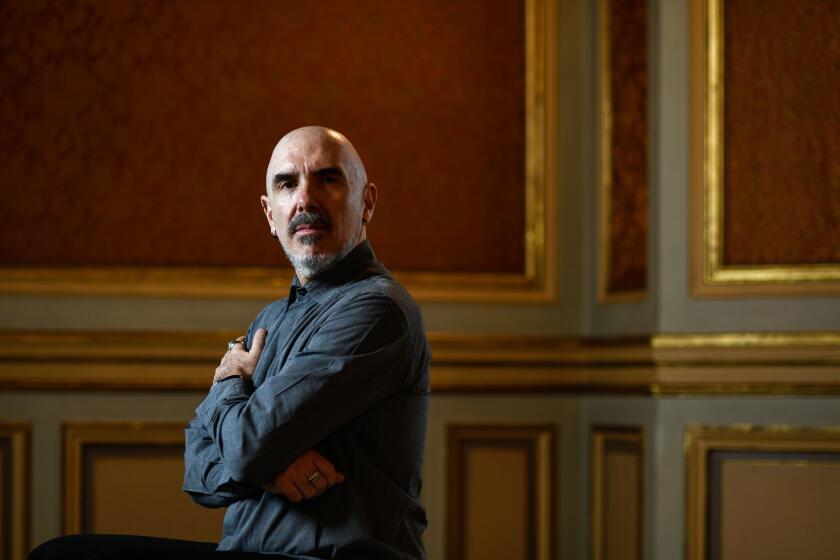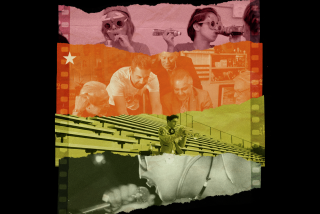Review: ‘This Is Not Berlin’ vividly conjures a bygone Mexican counterculture
The exuberant Mexican drama “This Is Not Berlin” opens with a quote from Proust and a blast of raucous misfit energy: It’s like a promise that we are about to see a memory broken open and poured out onscreen, raw and unfiltered. In the opening scene, boys from rival schools are locked in an afternoon brawl, while Carlos (Xabiani Ponce de León), a 17-year-old with a magnetic gaze and a resplendent mane, stands looking bored in the middle of the action. He doesn’t really belong here, in a world where so much unruly masculine energy can only express itself, tediously, through violence.
He’ll soon find another way. Inspired by the memories of its director, Hari Sama (who wrote the script with Rodrigo Ordóñez and Max Zunino), “This Is Not Berlin” is both a sensitive coming-of-age story and a vibrant, affectionate ode to Mexico City’s burgeoning counterculture. The year is 1986, not long after a major earthquake devastated the city and stirred widespread opposition to the corruption and ineptitude of the ruling government. A heady new wave of artistic and political experimentation is just emerging, and Carlos, the prototypical naive outsider, becomes our point of entry to this world of avant-garde aesthetics and righteous protest.
That might sound a touch formulaic, but Carlos is a more interesting cinematic guide than most. He and his best friend, Gera (José Antonio Toledano), who live in the suburb of Lomas Verdes, do a lot of the usual boys’ stuff: They smoke, sneak out their bedroom windows and swap pornographic magazines with friends at school. They come from financially comfortable, socially conservative families: Carlos has a little brother, a depressive mom (Marina de Tavira, a recent Oscar nominee for “Roma”) and a pot-toking black sheep of an uncle, Esteban (warmly played by Sama himself), from whom Carlos has inherited his musical tastes and a lesson or two in electronic engineering.
Why Mexico City’s roiling ‘80s art scene is Hari Sama’s focus in ‘This Is Not Berlin’
Ironically, it’s Carlos’ knack for tinkering that gets him noticed by Gera’s awesomely cool, Patti Smith-loving sister, Rita (Ximena Romo), when he repairs her boyfriend’s broken synth. Carlos and Gera are rewarded with a one-night-only invitation to join Rita and her band at the Azteca, an underground temple of forbidden delights. Vibrantly shot in hot hues and swirling camera movements by the cinematographer Alfredo Altamirano, the Azteca shocks, unnerves and thoroughly intoxicates the two teenagers. (“Is this a gay bar?” one of them asks, to which Rita replies, “This is an everything bar.”)
Both Carlos and Gera know that they must return to the Azteca immediately, though not necessarily for the same reasons. Although Carlos is taken under the wing of a gay artist, Nico (Mauro Sánchez Navarro), who’s clearly attracted to him, the question of his own sexuality is trickier to parse, at least initially. One of the picture’s sharper observations is that what keeps Carlos coming back to the Azteca is something less tangible and more elusive than sexual desire. It’s the booze and the drugs, of course, and also the thrilling, liberating sense of community, with its implicit promise of a political and intellectual awakening. A stylistic one, too, judging by the boldly asymmetrical haircut that Carlos is soon sporting at school, where he draws raised eyebrows and homophobic jabs.
Carlos is especially drawn to the confrontational performance art of Nico and his friends, much of it aimed at raising AIDS awareness and calling out anti-LGBT discrimination. Whether that means screening pornographic movies on the wall of a crowded stadium or marching naked through the streets covered in blood-red war paint, Carlos, like his collaborators, is unafraid to strip down and experiment in a movie that is, among other things, an unapologetic riot of male flesh.
Sama, whose previous features include “The Dream of Lu” and “Awakening Dust,” stages these sequences with a joyous punk verve and impressive verisimilitude (the homemade porn is shot with a juddering black-and-white camera). But he also notably captures the power of the Azteca’s spell without entirely succumbing to it. When Rita and her band land a gig at a much rougher outdoor venue, or when someone calls into question the sincerity of Nico’s activism, we catch glimpses of a Mexico whose tough realities cannot be concealed or mitigated by a seductive illusion.
It’s clear that the high won’t last, in any case. The drugs will wear off, the music will stop and the party will come to an end. Carlos and Gera’s fast-changing friendship lends the movie some emotional ballast, and so do their respective families — even the underdeveloped parental figures, who, as Carlos’ mother wryly notes, once acted out themselves in similar ways. Somehow existing both inside and outside the moment, “This Is Not Berlin” is clear-eyed enough to see that rebellion has its joys as well as its limits, and that coming of age — which is to say, coming into one’s own — means learning to recognize the difference.
‘This Is Not Berlin’
(In Spanish with English subtitles)
Not rated
Running time: 1 hour, 55 minutes
Playing: Landmark’s Nuart Theatre, West Los Angeles
‘This Is Not Berlin’
More to Read
Only good movies
Get the Indie Focus newsletter, Mark Olsen's weekly guide to the world of cinema.
You may occasionally receive promotional content from the Los Angeles Times.









